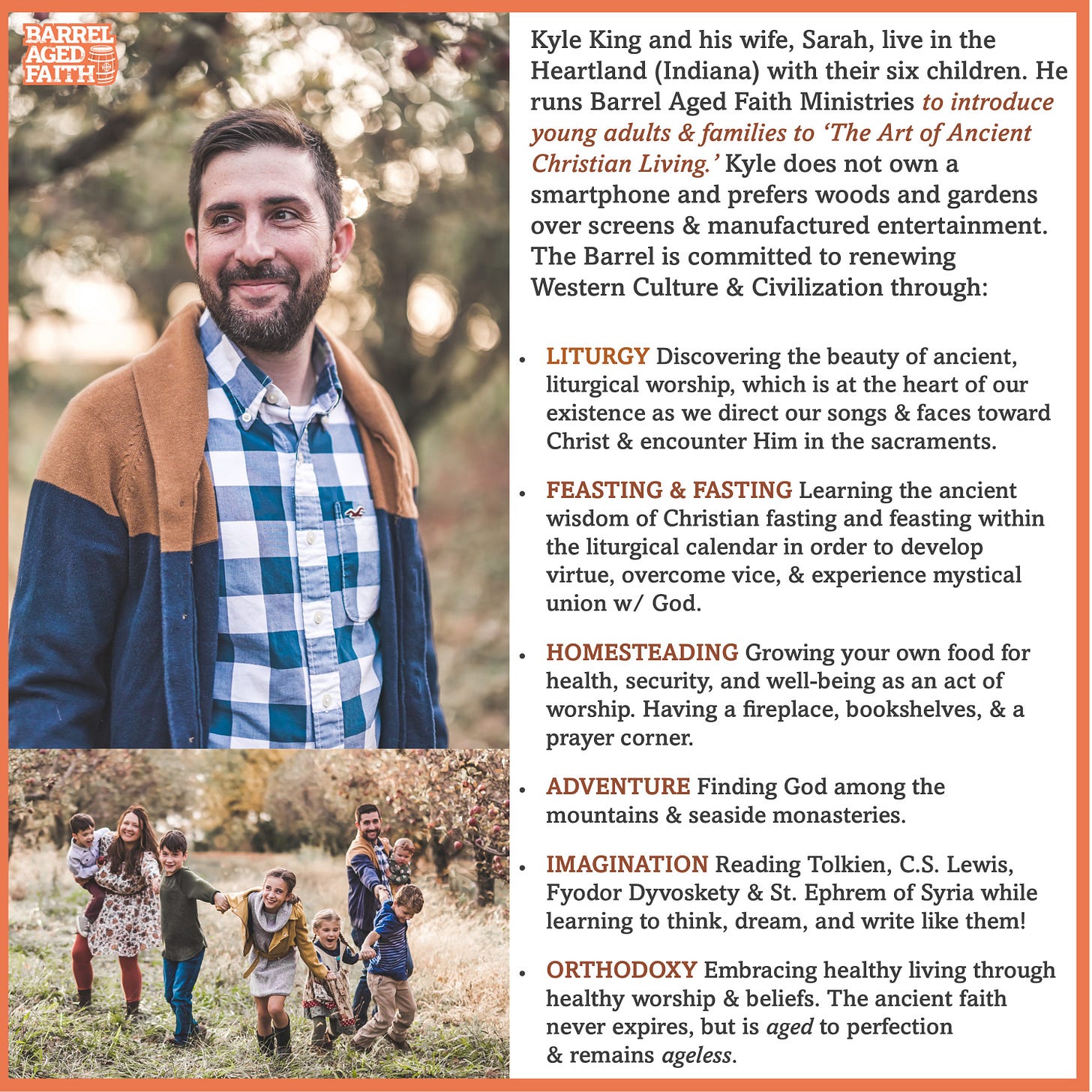Can Great Fiction Give Us New Eyes?
7 Reasons Why Christian Homes Should Read More Fiction! (w/ Scripture & the Saints)
#1: Fiction Can Be An “Escape INTO Reality.”
Scott Caldecott writes,
"It is the world of the everyday—boring, banal, dull, meaningless—that is the prison from which this kind of fantasy seeks to liberate us, not by distracting us from the real but by showing us the deeper patterns and meanings that lie concealed within it.” (Scott Caldecott, A Hidden Presence, pg. 2).
In other words, great fiction has the potential to give us new eyes to see the real world (God’s reality) and escape our own self-absorbed one.
#2: Fiction Can Warn Us of Future Dangers
C.S. Lewis wrote ‘That Hideous Strength’ as the fictional version of ‘The Abolition of Man,’ and both books warn us of what was coming down the pipeline with transhumanism and man losing the sense of his own identity and nature. Lewis writes,
“I am only making clear what Man’s conquest of Nature really means and especially that final stage in the conquest, which, perhaps, is not far off. The final stage is come when Man… by prenatal conditioning… and propaganda based on a perfect applied psychology, has obtained full control over himself. Human nature will be the last part of Nature to surrender to Man. The battle will then be won. We shall… be henceforth free to make our species whatever we wish it to be. The battle will indeed be won. But who, precisely, will have won it?”
#3 Fiction Can Give Us Hope About the World’s End
The greatest tragedy or darkest moment can still be a source of the greatest joy and light. J.R.R. Tolkien calls this a ‘good catastrophe’ or Eucatastrophe. Tolkien writes,
“Far more important is the Consolation of the Happy Ending. Almost I would venture to assert that all complete fairy-stories must have it. At least I would say that Tragedy is the true form of Drama, its highest function; but the opposite is true of Fairy-story. Since we do not appear to possess a word that expresses this opposite — I will call it Eucatastrophe. The eucatastrophic tale is the true form of fairy-tale, and its highest function. The consolation of fairy-stories, the joy of the happy ending: or more correctly of the good catastrophe, the sudden joyous "turn" (for there is no true end to any fairy-tale): this joy, which is one of the things which fairy-stories can produce supremely well, is not essentially 'escapist', nor 'fugitive'. In its fairy-tale—or otherworld—setting, it is a sudden and miraculous grace…” (On Fairy-Stories).
“the Resurrection was the greatest 'eucatastrophe' possible in the greatest Fairy Story – and produces that essential emotion: Christian joy which produces tears because it is qualitatively so like sorrow, because it comes from those places where Joy and Sorrow are at one, reconciled, as selfishness and altruism are lost in Love” (Letter 89).
#4 Fiction Can Evangelize Non-Christians and even Christians
When C.S. Lewis was an atheist at the age of 18, his world was changed after he read the fictional world of George Macdonald. Lewis writes,
“That night my imagination was, in a certain sense, baptized; the rest of me, not unnaturally, took longer [...] I had not the faintest notion what I had let myself in for by buying Phantastes.” (Surprised by Joy 172).
#5 Fiction Puts Flesh and Blood Onto the Abstract
Orthodox monk, Fr. Seraphim Rose, speaks on how fiction can better helps us understand Christian truths. He writes,
"Dickens communicates an extremely warm feeling about life, about human relationships, which is not given in schools today. And this very feeling of warmth about human relationships might have more effect on keeping a boy pure than giving him the abstract standard of Orthodoxy…The warmth of Dickens can help break through one-sided rationalism better than years of arguments, because even if you accept the truth you can still be cold and rationalistic and insensitive.” 1
#6 Fiction Can Teach Us To Love Difficult People
G.K. Chesterton once wrote,
“I wish we could sometimes love the characters in real life as we love the characters in romances. There are a great many human souls whom we should accept more kindly, and even appreciate more clearly, if we simply thought of them as people in a story.”2
#7 Fiction Can Teach Us To Slay Dragons
Another great quote from Chesterton is directed to parents on why they should allow and even encourage their children to read fairy tales:
“Fairy tales do not tell children the dragons exist. Children already know that dragons exist. Fairy tales tell children the dragons can be killed.”
C.S. Lewis says it in a little different way:
““Since it is so likely that children will meet cruel enemies, let them at least have heard of brave knights and heroic courage. Otherwise you are making their destiny not brighter but darker...”
https://iconandlight.wordpress.com/2019/09/02/the-warmth-of-dickens-father-seraphim-rose/
G.K. Chesterton (What I Saw in America)





Totally agree, love the quotations. My daughter is Orthodox as am I, and she began a very successful Classical Christian School in Albuquerque based on those very concepts and the desire to fan into flame the wonder and awe that is natural to children and guide them toward great literature, including fiction. On the other hand, the road is very, very difficult for those of us who have devoted ourselves to writing generally unmarketable fiction that aspires toward the same aims.
Yes yes and yes! Great post, Kyle. You’ve got “the big 3” lined up in your article (Lewis, Tolkien, and Chesterton) so I’m on board!